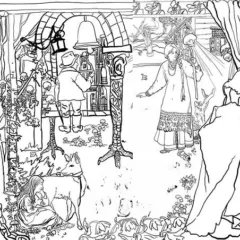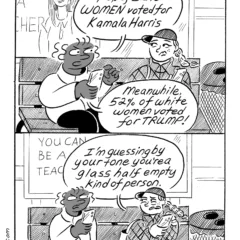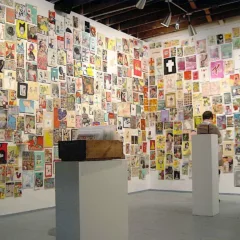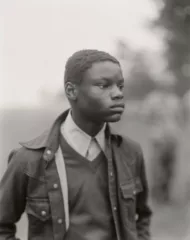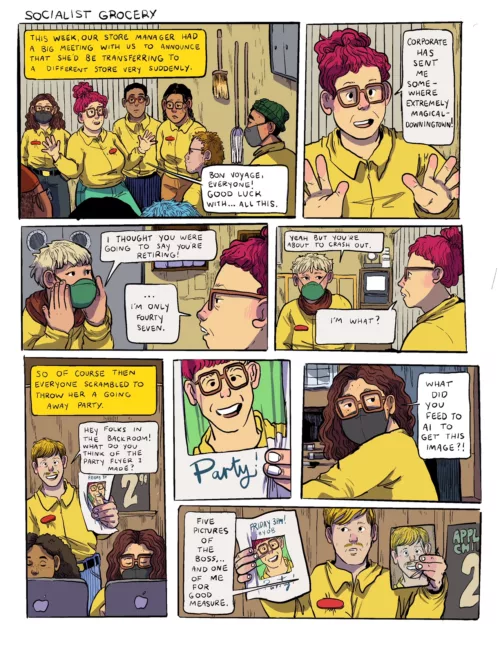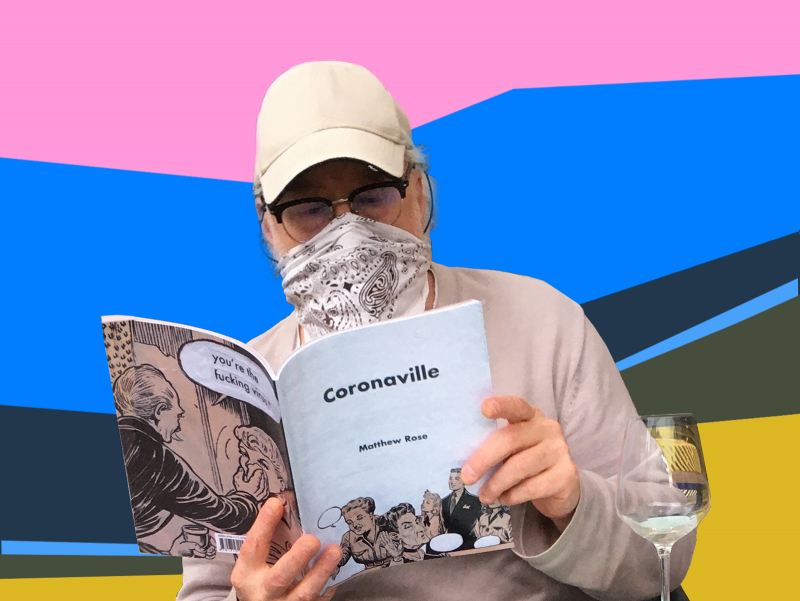
On this episode of Artblog Radio, Roberta video chats with former Artblog contributor Matthew Rose about his book ‘Coronaville.’ As an expat living in France, Matthew critiques the uniquely American response to the pandemic. Coronaville is inhabited by people who the internet would call “Kens” and “Karens”– characters who are stereotypically white, individualistic, narrow minded, and conspiratorial. The book repurposes illustrations by French artist René Brantonne by replacing the original speech bubbles with text appropriated from headlines, social media, and overheard conversations. This conversation is available in three formats– we highly recommend giving it a listen on Artblog Radio, a watch on Youtube (embedded here), or a read via the transcription below!
You can purchase ‘Coronaville’ on blurb.
You can listen to Artblog Radio on Apple Podcasts and Spotify. Thank you to Kyle McKay for composing Artblog Radio’s original podcast intro and outro!
Artblog Radio
Audio PlayerYoutube
Transcription
Roberta Fallon: I want to introduce myself. I’m Roberta Fallon, and you’re going to be listening to Artblog radio. So first off, thank you for being here from all around the world, Los Angeles and, Germany and, New Jersey and Philadelphia and elsewhere.
I’m sorry if I missed anybody. today we’re talking with Matthew Rose. Hi, Matthew.
Matthew Rose: Hi, Roberta!
Roberta Fallon: Matthew Rose is an artist. As you all know a writer, a musician, he lives in Paris. He’s also been a contributor to Artblog for many years, and we’ve loved all of the content, the written content and commentary that he’s provided to us between 2007 and 2018.
So. We have a relationship with Matthew and we’re really happy and proud to be here and talking with him about his new book called Coronaville. It’s an adaptation of a comic book, illustrations of Rene Brantonne, the French illustrator and commercial artist known for his science fiction illustrations and other things.
He designed the “Esso” sign. “Esso” gasoline, apparently I read that somewhere.
Matthew Rose: Okay. I didn’t know that.
Roberta Fallon: Wikipedia, my friend.
Matthew Rose: Okay. [chuckle]
Roberta Fallon: So Coronaville is a fractured narrative whose words mirror today’s news. With pictures, however, that are a throwback to the days of cars with running boards; with dialogue that is ratatat tat non-sequitur. The book– which Matthew calls a “quaran-zine”, I love that word, it’s a really great word– seems like a graphic adaptation of a Marx brothers movie. From bleach cures to blaming China or Obama or Hillary, with lots of asides about vaccines and Ivanka and Jared. I love those. The book was created in 40 panels over 40 days and 40 nights. It’s a fever dream in print.
So Matthew, let’s talk about your source for this book. It was a comic book. It is a comic book. It’s not from this era at all. and we can see the original pictures, but we can only guess at what the story is… It’s really non understandable in a way, non decipherable. And especially because we can’t read what’s in the thought bubbles, except what you put in there.
So talk about that.
Matthew Rose: The, the original, comic book, they call it a bande dessineée. It was, it was a seriously a book with, several, many paneled, many page episodes, of certain stories. one, I suppose it was the feature story, was, uh, Tour de France and, They kind of get mixed up in that in some way they follow the race all around France, other stories, I can’t even remember because when I purchased the book at a, a flea market, a book called, it was kinda torn apart. And so not all of the panels were visible.
But the, the story follows a young teenage girl named, Pauline and her friends as they kind of moved through late adolescence and, meet people, go places, do things and interact with their family and friends.
And I just love the drawings. And so. It’s kind of a, I repurposed Rene Brantonne’s drawings in order to advance a different kind of narrative that, because it’s so incoherent that narrative with this one that we’re living through, I thought it just opened up many, many possibilities.
Plus people are talking to each other, so… And of course they’re all white and they’re all happy and friendly and you know, slightly puzzled. So I thought this the, they were perfect vehicles of the Ken’s and Karen’s of what we have now in America.
Roberta Fallon: Yeah. You put a lot of sour dialogue into those sweet people’s mouths. [laughter] Let’s talk about that text then. It seems to me that it’s all ripped from the headlines in some– you know, of today’s papers and news sources– and some of them even seem to mirror what came out of people’s mouths that you actually read, like quotes from Trump or whatever.
Let’s talk about episode six. If you haven’t seen the book yet, it’s really marvelous and you can get it on blurb. It’s a print-on-demand and I highly recommend it. It’s not a lot of money and it’s a very wonderful capsule of the time.
So like for example, there’s things that you remember happening. So it seems like time has been passing through the course of flipping through the book. Like in episode six, someone says John Prine is dead. Now, if you know, music of contemporary, you know, Americana, John Prine was a King of that. And I remember when they announced that on the radio, John Prine had died of Corona. So that actually happened. So talk about the sources of the words.
Matthew Rose: Well, just the John prime, citation. I probably did that panel that episode that day that I heard John Prine had died. He’s just a fabulous human being loved by everyone, amazing musician and a very generous person. And he was one of the first very well-known, celebrities to die.
And I think that shook up a lot of people certainly shook me up. Made me think that this is an incredibly serious and deadly disease. So yes, I, I did pull that out and a very simple, note there, the, this girl comes down the stairs and she says that to her mother or her aunt,
The other texts are… let’s just say they’re they come either from headlines, from people talking on the radio from guests being interviewed on television shows. And then intersperse with that, or these kinds of been now dumb ass slogans that, you heard all the time, like “Keep America Great,” “Make America great.”
I found it very, Strange that all, all conversations were being peppered with that. So I was talking about what happened when they happened. For instance, people were talking about soap all the time and, washing your hands, of course. and then also things that were occurring, on television, on radio shows and the newspapers, as, as folks were describing what Coronavirus is, I was listening to, a bunch of neurologists from Columbia University almost every day.
And they were talking about the nature of this virus, how it functions, how it enters the body. And, and folks were talking also about. Coronavirus being a Chinese bio weapon. So is it nature? Is it culture? Is it a weapon or is it just nature saying, you know, it’s, it’s time to do whatever it has to do.
Does, does it have a purpose? I kind of don’t think so, but, people have their own ideas. So I, in this particular panel, I have this, you know, scientist mixing something up and he’s saying, ironically, that Corona is a child of nature and here he is, supposedly like he’s mixing it up.
So the sense and absurdity of it all is, is part of that. And, I, I I’m, I’m happy with that kind of craziness that there, there was another thing I’m sure everybody is aware of. Right at the beginning, folks were rushing out to, grocery stores and convenience stores to buy as much toilet papers they could because they didn’t know whether they’d be able to go out again and they needed to have, you know, 50 rolls of it and, and stock up. And cans of beans, I suppose, were also flying off the shelves. So, My people in Coronaville were searching, dramatically for toilet paper.
And then there are also little indications about the timeframe, people asking if it was Easter and also the, In addition to toilet paper and soap and beans, people were also racing to buy guns. I don’t think they sold as many guns in, in the, in the spring and summer, ever.
It was insane. So there you are.
Roberta Fallon: Yeah. So I want to get into a little bit more of the words. You studied Semiotics in college and you’ve always used words in your art. Alphabet words– either with or without all the letters in them– appear regularly, maybe in every single piece of your art, I don’t know, in one way, shape or form.
And the way you use it, words in your art is very… It’s what you did here, or you cut them up, you cut. You’re collage artist and you cut things up and you place them back together with your imprint on them. So this is right out of the, the way you work, your art
Matthew Rose: of the Matthew Rose playbook.
Roberta Fallon: out of the Matthew Rose playbook. Exactly.
Matthew Rose: Well, the, the way I, I wrote this, this graphic novel was I just had a single document on my computer and every day, I’d listened to the radio, read the news, talk to friends, have hilarious conversations, with, with people and, and grab a phrase here or there. And I have these giant paragraphs.
And then after let’s say I had six or seven pages, I would print them out on my friend Oregon’s, printer, which I have. and I cut them up. And from that cutting activity, I would design or, write the narrative. I had an idea sometimes, but I wasn’t quite sure. Well, is this end day is what is this?
And, [Roberta laughs] but, but of course, a lot of these things were, were quite real. I mean, we all lived through it, nobody on the planet, was absent from this particular real life time narrative. So these things echo and, unfortunately, they still echo. It’s still, I was surprised how relevant it would be day after day after day, months later.
Even now it just seems so relevant. I go back and read it and say, “wow,” I mean, those ideas are still very prevalent now.
Roberta Fallon: Yeah.
Matthew Rose: I mean the death counts. The case counts. Keep on going up. This is, this is not changed. Although it is dated in a way, but it’s, it’s still quite relevant. but [both speak at same time] go ahead, sorry.
Roberta Fallon: Oh, no, no, no, I should let you talk. But I do want to say echo chamber, we’re all in the same echo chamber. It doesn’t matter where we are. We are all talking about the coronavirus and you know, pangolins, and now we have the extra threat of the election looming large. And I want to talk about politics a little bit because obviously there’s politics in here as well as the coronavirus. I mean the two go hand in hand in our society now.
On episode 27, which is near the end of the book, you’ve got a whole page where the dialogue is just coughing. Everybody’s coughing, cough, cough, cough. It’s like, we’re all caught in this cough-arama and at the way, bottom, it says Trump Pence 2020.
And I want to say that really captured that page for me, captures the spirit of the book overtly. I mean, it’s in there on every page, but it’s almost like you are advertising Pence and Trump– not you Matthew Rose, but the Corona virus– is the advertisement for Trump Pence these days. It just has to be,
Matthew Rose: All you had to do was, was read yesterday’s or this morning’s newspaper to see that Jared Kushner was saying exactly that. There is no, there’s no daylight between what they said, what they thought in the, in may of this past year. And what exactly happened. They use the virus as a way to promote, you know, they’re, they’re making America great again. I mean, to me, that’s off the charts, crazy. Although there are lots of people who love them and they think it’s fantastic.
They wanted to did not own the virus, get rid of the doctors and they wanted to own the opening. So, regardless of all these people getting sick and those numbers will go up. I mean, by, by 2021, 400,000 people could be dead a lot more around the, around the world. But, that, that coughing. w it was a funny thing, because at that time that I did that, I were walking around the streets for one hour a day during the lockdown in the Spring.
And if somebody coughed in a grocery store, you just turned around and said, “Who’s that? What’s going on?” And, you know, we didn’t know what the deal was. We had no idea how, susceptible we were to the least bit of virus. And that, that’s why, in that other panel you showed, you know, somebody coughed on a doorknob and this person caught it.
There’s a lot of vulnerable, vulnerable people, physically, medically, out there. And, it’s quite possible. They, they, caught the Coronavirus from touch. It doesn’t seem as likely now as, as it was then, but we didn’t know. And we still don’t know. but those sorts of things, where people coughed or sneezed or somebody walked around without a mask and they were talking loud and you can just tell that you’re spitting or sneezing into, into the air. I mean, it just raised zillions of questions about responsibility and community and who are you? And then those people who politically, which is, I guess that’s a core of your question who refuse to wear a mask and instead walked around with guns. That these people were all about their own Liberty, but they could care less.
They could give two shits about your liberty to be alive. It didn’t matter to them. They did. I mean, even though it was explained a hundred times, they are asymptomatic carriers of this disease, but yet they wanted to go out there and March for Liberty and a kidnap the governor of Michigan.
Roberta Fallon: Right. Right. And, and take their motorcycle and go to Sturgis… what 500,000 people did. Yeah.
So let’s swing around to another theme of the book, which. Is also a part of your arts ouvre, which is death. You have, this is not the first project that has as a theme, sort of the vulnerability of people, the shortness of life. it’s right there. You had a project in 2009. I believe it was, it was called the book, “A book about death.” And it was an international project that, uh, had exhibitions. One was in New York. I know where there are others. I think maybe there was
Matthew Rose: The last one was in Japan at the Karuizawa New Art Museum. I had an exhibition there and then I installed the New York show there. It’ss 487 postcards, or works of art. A3, sorry, A4 size, postcard size. It was a restaging of the New York show we did at the Emily Harvey Foundation Gallery on September 10th, 2009. So that was the 30th exhibition.
And I wanted to take that show around the world. Nobody paid for it, nobody got paid for it. and it, it is, How shall I describe it? It’s a rumination on death, individually and collectively. We had, a lot of very thoughtful works that came in. They came in through the mail, which was an echo of Ray Johnson’s project, which was a called “a book about death.”
And those were drawings on eight and a half by 11 sheets that he mailed out to friends. So I used that. I knew Ray and, his good friend, Bill Wilson, who has passed, was at the exhibition in New York. And he was, he said, Ray would have liked this. So I felt I was okay. I didn’t abuse that relationship, but celebrated him and his ideas. And, you know, death is, is something that everybody, experiences personally. And, they have questions about it. Some are, some are funny, some are terrifying. Some are very emotional. Some are, some are just questions about, you know, what’s on the other side.
But it’s a powerful thing and it attracted a lot of people. Altogether, I think we had 5,000 people over the 30 exhibitions who contributed to the exhibitions. New works were made. Museums exhibited, the works, one guy in Italy printed the works out from the internet and put them in a bar in a, in a cove in Milano. A woman in Bosnia, Herzegovina put them up. I’m not sure where it could have been also in a bar.
It was a fascinating thing and, a great collective project. And a lot of people came together, to form other groups because they met through a book about death.
Roberta Fallon: So maybe this Coronaville book will be another community project in a way that brings people together, thinking thoughts about our mortality.
Matthew Rose: I think, I don’t know about other people jumping onto the Coronaville bandwagon because it’s a very cynical acid look at-
Roberta Fallon: mhmm.
Matthew Rose: -kind of who we’ve become, in, in the very modern era. We’ve become… [sigh] kind of uninformed tribal actors trying to beat each other up over stupid ideas.
And, you know, what could I tell you? I, it doesn’t, it doesn’t bode well for, For the future, unless we, we, we, we get off the saying things… we, we stopped saying things like, you know, “Hunter Biden’s laptop is real” and you know, more emails about this person or that person.
I’m not quite sure how you dial it all back. I don’t know.
Roberta Fallon: I’m not sure either, but I agree with you that we do need to dial it back. you know, we love the internet. We hate the internet. We love social media. We hate it. It just… but we’re all addicted to it one way or another. We’re there all day, all evening.
You know, it’s with us… the first thing we look at in the morning. The last thing we do before we turn off the light at night.
Matthew Rose: There’s a lot of that. [laughter] but that’s, that’s, that’s our world now. And I th I think that the coronavirus, and the Trump virus has made us pay a lot more attention to each other.
So in that way, perhaps there is a community that is emerging. That is more conscious of the planet, more conscious of each other, and inspiring the fact that we struggle and yell at each other on the internet. I certainly do my share of it. I think that perhaps a greater consciousness is, is arriving, although it’s not apparent, but I, I, I would think that it is.
Roberta Fallon: I think November 3rd, or November 4th, or November 5th will tell us a lot about what’s emerging.
Matthew Rose: Well, you’re in Philadelphia, Pennsylvania, the battleground state. Of the nation. So the world is watching you.
Roberta Fallon: We’re gunna battle it out here.
Matthew Rose: I did vote. I, I I’d like to mention this. I did vote,
absentee by mail in Florida. So hopefully, my vote will cancel out, you know who’s.
Roberta Fallon: Bravo for that. I want to open it up to questions at this point. Does anybody have anything they want to say to Matthew or share with him or, random thoughts?
Oregon Hunter: I do. I, can you hear me okay? Perfect. Good. Okay. Matthew, is this, uh, the Coronavirus? Is it affected your, your dream life? Your dream state? And has that influenced your work?
Matthew Rose: I think I sleep a lot, very lightly I’m easily woken up. where prior to this situation, I slept very deep. Um, dream state, in terms of remembering the dreams, it’s hard to say. I’ve had very intense dreams. I mean that, I remember the texture of the dreams way more intense now than before.
I think in general, I’m more anxious and perhaps that’s what that’s about. How about you?
Oregon Hunter: Yeah. A lot of, really vivid dreams, problem solving, every night. I, I, when I wake up in the morning, I tell daddy about all the problems I’ve been trying to solve at night and I haven’t solved them. I’m still working on them.
Matthew Rose: Yeah. [chuckle] Understandable.
Oregon Hunter: [chuckle]
Roberta Fallon: That’s great. Anybody else? Yes.
Karin: Yes, I have a question [speaking at same time as someone else] Sorry?
Roberta Fallon: Uh, how about Carina first?
Karin: Ok,
Roberta Fallon: Karin, Karin.
Karin: Apologies. Thank you. yeah, I wanted to know, because you live in Paris. So when you put that Coronaville book together where you would thinking exclusively of an American audience? Or did you, you show it to people in Paris? And, how has your, you know, your view of America as an expatriate in Paris, because I can tell for myself being an expat in DC, or in America, I I’m having totally different and more intense interest in what’s going on in Germany.
And, and I’m, I’m reading up more on history or anything else on Germany than I’ve done ever before when I was there. So, I would like to know whether you think that you have kind of a fresher perspective on what’s going on in the U S S as opposed to, as if you were in the U S whether that would dumb you down or something.
Matthew Rose: I would say that I spent quite a bit of time thinking now about America more than I did before. I feel in some ways, perhaps that, since the virus came and swept us into its Whirlpool, I haven’t been able to think a lot about. France or anything else? I mean, I was in Japan in December and I love being there, but when the virus hit, I kept on just thinking that the center of this whole thing is America.
When I was making these panels in the Spring, I would publish them almost every single day on my Instagram. And, and people would comment. And many of the people who commented– because it was, it is in English and people related to the narrative– those Americans would say to me, either in the comments section or privately or on other social media platforms.. They would tell me, yes, this is happening or this is worse than you say it is. So it really focus my energies, my political ideas and views on America and what was happening there. I was always somewhat political, but never as political, I think, as I am now. The sociology of the American mind, the geometry of this virus, how things are, are cut up and chopped up and spun politically spun.
It, it, it seems almost an American sport. And so like watching car wrecks on the road, I couldn’t pull my attention away. Which maybe says something really bad about me, but yes. I mean, I do think a lot more about America perhaps now than I do about France.
So I understand your attention, being focused on Germany because that’s, that’s where you’re from. That’s what, you know, it’s in your DNA, I guess.
Karin Rosnizeck: Thank you.
Roberta Fallon: Okay, next question. Temporal Comet.
Temporal Comet: Sure. Hi. So going back to social media, I feel like you’ve created something where there’s almost a circular motion whereby the zeitgeist and what you’re interacting with on social media is feeding into your work, and then you’re putting that back onto Instagram, for example, especially with the Coronaville panels.
I’m just wondering what kind of, if you have any, interesting anecdotes or insight into the kind of comments that you’ve got back there, due to the controversial nature of what you’ve been doing.
Matthew Rose: Well, that’s a good question. I was publishing these panels on Instagram and a friend in San Francisco, who I know from Brown, where I went to school… He said, you know, Matthew, you know, people are dying.
This, this was in the beginning of April. He said, people are dying… You know, your comic is very cruel; it’s very cynical and, and, you know, Yeah. He was basically asking me, “Where’s love?” And, and so I took that into account. I said, you know, you’re right..
His name is Jim; I said, you’re right, Jim. And so I went to work immediately. I’m not sure which, panel it is, but it’s called letters to Coronaville. And so, I kind of broke the fourth wall of, of the book as if it was like a television program, talking directly to the audience and, and, somebody, Says, dear Corona Ville, your comic is, is, is, is, is fucking disgusting.
And you know, you’re all about death and it’s horrible. What’s wrong with you. And it’s funny cause these people who were arriving were saying it we’re in Corona, that, and, and this person was outside of it looking in, and yet he absorbed the, the, the narrative and the story via social media. So I was definitely mixing that in there trying to create, a crazy stew of irony and, and reality. And, and I didn’t want people to think that I disliked them. I was criticizing them. And at the same time being very clear and honest about the platform with which my idea and other ideas were, were moving around.
I mean, all you have to do is look at how Twitter and Facebook took down that New York post story, about Hunter Biden’s laptop and, and people were complaining about that when, if they really wanted to, they could just go look at the New York post.
But the thing is the social media became the, the, the perpetrator, the victim, the, the bad guy, the good guy… It’s strange. does that answer your question?
Temporal Comet: Sure. Thanks.
Roberta Fallon: [laughter from all] Good answer. Well, I want to thank everybody. Thank you, Matthew, especially for being here today and sharing your thoughts about your book and sharing your great book with us. Everybody can get a copy of Coronaville at blurb. And when we publish this on our blog, we’ll have the URL so you can click on it and get straight over there. We can also all follow Matthew on Instagram @Mistahcoughdrop.
Matthew Rose: Yeah. That’s me [chuckle]
Roberta Fallon: And if you want to know more about the, book about death, we’ll put the URL for that in also thank you for joining us on Artblog Radio. It was really great to have you here today and Matthew, many, many thanks.
Matthew Rose: Thank you, Roberta. And, and if people haven’t, looked at the Artblog, it’s theartblog.org and they should read it. It’s great writing. And, you. You should, check it out and support !
Roberta Fallon: Thank you.
Matthew Rose: Okay. Thank you, Roberta. Thank you everyone for tuning in.
Roberta Fallon: Thank you all.
Matthew Rose: And thank you Morgan for helping out.
Roberta Fallon: Thanks. Bye, bye.
Matthew Rose: Bye bye.


